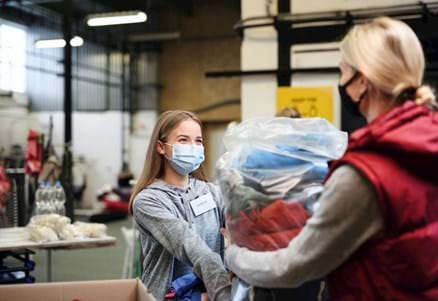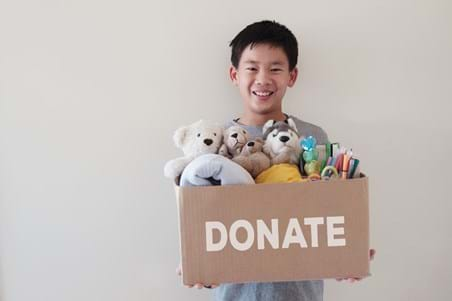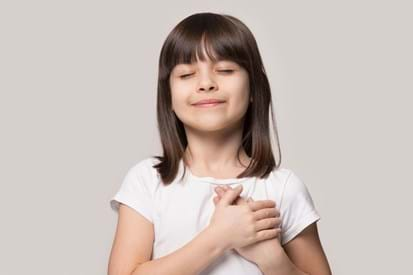Educating kids about money when they are young is important. Not only will it assist them to be financially responsible as they get older, but it will also benefit the communities and economies in which they inhabit. But in a consumer and achievement-driven society, it can be easy to get caught up in focusing on our own financial success while losing sight of the bigger picture and the prosperity of others. Financial literacy should be inclusive of education which encourages empathy and generosity and how we as individuals can make contributions and have a positive impact on the wider community.
“Parents are in a position to be their children’s first financial educators, instilling the values of responsibility and generosity.” - Neale Godfrey, author of ‘Money Doesn’t Grow on Trees: A Parent’s Guide to Raising Financially Responsible Children’

Charity begins at home or so they say. The term essentially refers to the idea that you should take care of your family and loved ones before helping people outside of your immediate circle. But could it also apply to the idea that home is the first place our kids learn about being charitable? Perhaps even experiencing it first-hand through their own parents’ charitable acts. Then, as kids begin to establish their own financial foundations they also develop an awareness of considering the needs of others.
Empathy, Compassion and Gratitude
Cultivating empathy and gratitude in childhood will help to ensure a balanced approach to wealth in later years. Firstly we need to introduce the idea that some kids (make it relatable by talking about kids their age) don’t have the same opportunities or access to the same privileges. This is not to induce feelings of guilt or shame, but rather to highlight the abundance your child has access to and to foster feelings of gratitude and appreciation for what they have. This then enables opportunities for empathy and compassion to develop, giving your child a chance to put themselves in someone else’s shoes and imagine how someone else might feel. Empathy also generates reflection around what action they could take to help someone.

International travel is a great way to expose your children to different ways of living and contrasting lifestyles and can help them to witness first-hand the fact that poverty does exist. By gently expanding your child’s horizons you are also providing a fertile ground from which empathy can grow. Having compassion for those less fortunate enables children to develop a strong moral compass and the desire to share their own good fortune with others.
Reminding your child how lucky they are helps them to reflect on their circumstances. A regular gratitude practice also assists this appreciation and helps kids to appreciate what they already have rather than striving for the next new thing. Simple things we take for granted every day like running water and a flushable toilet are hugely luxurious in some communities. When my seven-year-old son pulls a face if I offer him an apple or orange as a snack, I like to remind him that his own grandfather received an apple and an orange in his Christmas stocking when he was a little boy (as well as one small bar of chocolate). These were all considered a special and luxurious treat in Northern Ireland in the early 1950s.

Even here in current-day Australia there is a huge spectrum of wealth distribution, from the very disadvantaged to the outrageously rich. With some awareness and observation, it’s not so hard to miss. My son recently saw a woman lying on hard cement one evening on the edge of a basketball court he sometimes plays at with his dad. We were walking across the court back to our car in the dark, each with an ice cream in hand, a special treat on a Friday evening. The stark contrast between indulging in a $5 ice cream each and a woman who didn’t have anywhere to stay overnight was not missed by my son. He asked me questions about why she might have been in the situation in the first place and what would she would do if it rained. It was a tricky but important conversation. We talked about how some people don’t have a family to look after them when they are having a hard time. We opened up the conversation about shelters and donations for people in need. That chat with my son ended up being more rewarding than the sickly sweet ice cream sitting in my belly.
Kindness and Generosity
Cultivating kindness and generosity is also key in raising kids who consider others. Dropping off a batch of home-baked cookies for an injured neighbour, or sharing excess lemons from your backyard tree with a teacher are simple ways to demonstrate that when we share we can have a positive impact. Children are inevitably introduced to the concept of sharing as they grow. Parents we can foster this and encourage, for example, the lending of books to friends or eating from platters and share plates.
As parents, if we can model kindness, compassion and generosity and nurture these in our children as they grow, we are helping to build a more ethical and moral society. A world built on unity, not separation. Next week we will explore some of the more practical ways to introduce charitable acts to your children.

Alison Gallagher is a freelance writer, resourcefulness expert and entrepreneur. She has been featured in various publications including Stellar Magazine, Australian Health and Fitness Magazine, and Cleo Magazine. Alison is particularly passionate about sharing practical tips on how to live simply, sustainably and seasonally.






